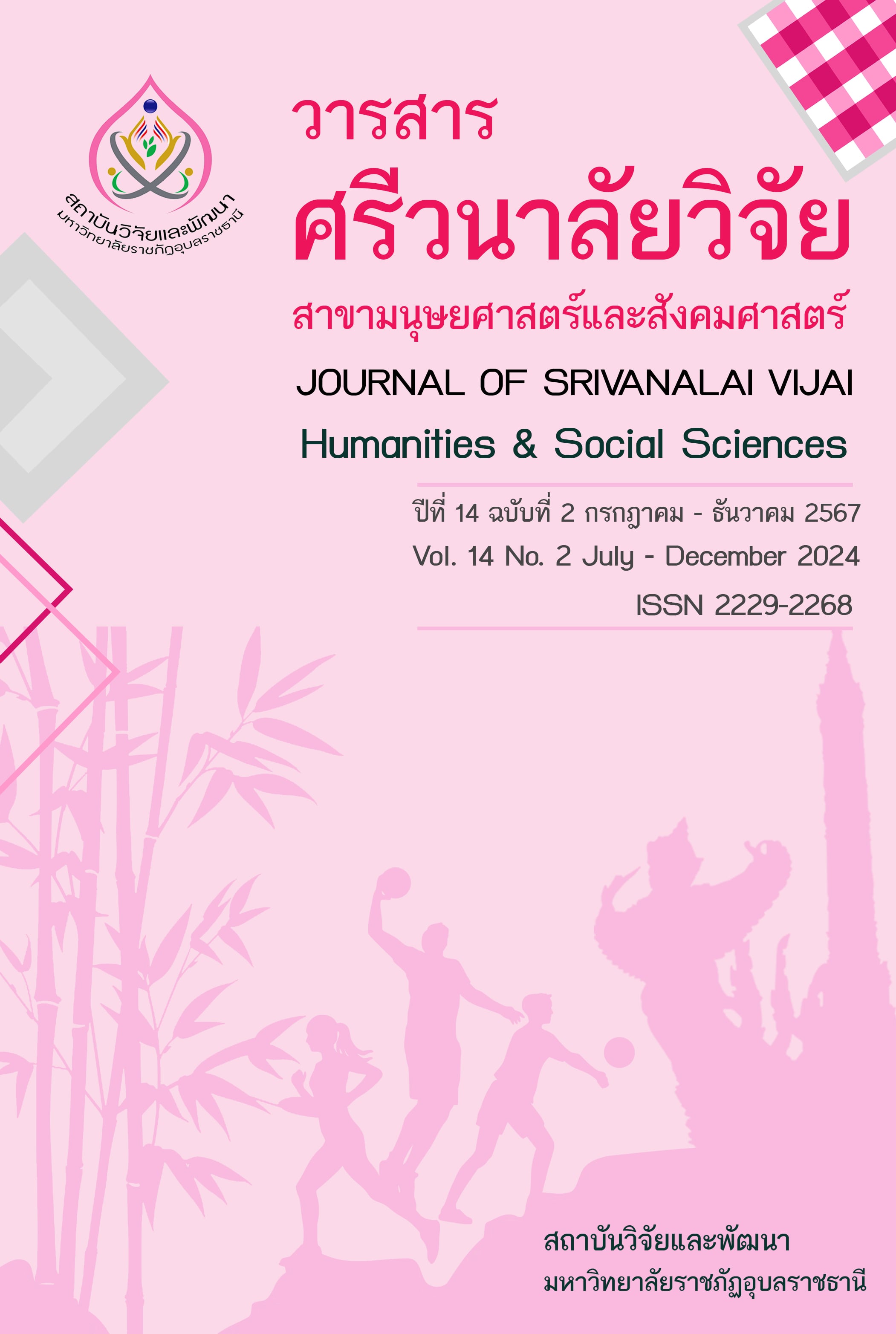สภาพ ความต้องการจำเป็นและแนวทางพัฒนาทรัพยากรมนุษย์ในยุคชีวิต วิถีใหม่ สังกัดสำนักงานเขตพื้นที่การศึกษาประถมศึกษาบึงกาฬ
Main Article Content
บทคัดย่อ
การวิจัยครั้งนี้มีวัตถุประสงค์เพื่อ 1) ศึกษาสภาพปัจจุบันและสภาพที่พึงประสงค์ของการพัฒนาทรัพยากรมนุษย์ในยุคชีวิตวิถีใหม่ 2) ประเมินความต้องการจำเป็นของการพัฒนาทรัพยากรมนุษย์ในยุคชีวิตวิถีใหม่ 3) พัฒนาแนวทางพัฒนาทรัพยากรมนุษย์ในยุคชีวิตวิถีใหม่ กลุ่มตัวอย่าง ได้แก่ ผู้บริหารสถานศึกษาและครู สังกัดสำนักงานเขตพื้นที่การศึกษาประถมศึกษาบึงกาฬ ปีการศึกษา 2565 จำนวน 353 คน โดยวิธีการสุ่มแบบหลายขั้นตอน เครื่องมือที่ใช้ในการวิจัย มีจำนวน 4 ฉบับ คือ 1) แบบสอบถามสภาพปัจจุบัน มีค่าความเชื่อมั่นทั้งฉบับเท่ากับ .98 2) แบบสอบถามสภาพที่พึงประสงค์ มีค่าความเชื่อมั่นทั้งฉบับเท่ากับ .98 3) แบบสัมภาษณ์แบบมีโครงสร้าง มีค่าดัชนีความสอดคล้องเชิงเนื้อหาเท่ากับ 1.00 และ4) แบบประเมินความเหมาะสมและความเป็นไปได้ของแนวทางการพัฒนาทรัพยากรมนุษย์ในยุคชีวิตวิถีใหม่ มีค่าดัชนีความสอดคล้องเชิงเนื้อหาเท่ากับ 1.00 สถิติที่ใช้ ได้แก่ ร้อยละ ค่าเฉลี่ย ส่วนเบี่ยงเบนมาตรฐานและดัชนีการจัดลำดับความสำคัญของความต้องการจำเป็นแบบปรับปรุง
ผลการวิจัยพบว่า 1) สภาพปัจจุบัน โดยรวมอยู่ในระดับมาก สภาพที่พึงประสงค์ โดยรวมอยู่ในระดับมากที่สุด 2) ความต้องการจำเป็นมีค่าสูงกว่าค่าโดยรวม ได้แก่ ด้านความยืดหยุ่นและคล่องตัวตามสถานการณ์ ด้านการวางแผนและพัฒนาทักษะในยุคชีวิตวิถีใหม่ 3) แนวทางพัฒนา 1) การวางแผนและพัฒนาทักษะในยุคชีวิตวิถีใหม่ ผู้บริหารวางแผนออกแบบและส่งเสริมสนับสนุนให้บุคลากรพัฒนาตนเอง พัฒนาสมรรถนะด้านเทคโนโลยีรูปแบบอบรมออนไลน์ ให้ทันยุคสมัย 2) ความยืดหยุ่นและคล่องตัวตามสถานการณ์ปรับการทำงานและเตรียมความพร้อมให้มีความยืดหยุ่นคล่องตัว ทำงานได้ทุกที่ทุกเวลาหรือการประชุมในรูปแบบออนไลน์ 3) การสร้างวัฒนธรรมองค์กรและการสร้างเครือข่าย การตั้งเป้าหมาย แนวทางในการปฏิบัติงานของตนเองที่ความสอดคล้องกับเพื่อนร่วมงานเป็นไปในทิศทาง 4) การประเมินและรายงานผลการดำเนินงาน ผู้บริหารควรกำหนดเกณฑ์การประเมินร่วมกับบุคลากร สนับสนุนให้มีการประเมินในรูปแบบออนไลน์มากขึ้น ลดการประเมิน ผลการประเมินแนวทางพัฒนาโดยรวมพบว่า มีความเหมาะสมอยู่ในระดับมากที่สุด และมีความเป็นไปได้อยู่ในระดับมาก
Article Details
เอกสารอ้างอิง
กชกร สุขศิริสมบัติ และคณะ. (2566). แนวทางการพัฒนาทรัพยากรมนุษย์และการปรับตัวในชีวิตวิถีใหม่ที่มีผลต่อ
ประสิทธิภาพการปฏิบัติงานของพนักงานโรงแรมแห่งหนึ่งในจังหวัดภูเก็ต. วารสารวิชาการมหาวิทยาลัย
ราชภัฏภูเก็ต, 19(2), 78-98.
เกียรติ บุญยโพ. (2562). การบริหารทรัพยากรมนุษย์ในยุคใหม่. วารสารวิทยาการจัดการปริทัศน์, 21(1), 165-170.
จินต์จุฑา จันทร์ประสิทธิ์. (2559). การพัฒนาทรัพยากรมนุษย์ของบุคลากรทางการศึกษาสถาบันบัณฑิตพัฒน์ศิลป์.
การค้นคว้าอิสระปริญญามหาบัณฑิต มหาวิทยาลัยเทคโนโลยีราชมงคลรัตนโกสินทร์.
ชัยชนะ มิตรพันธ์. (2563). Go digital with ETDA. กรุงเทพ ฯ : สำนักงานพัฒนาธุรกรรมทางอิเล็กทรอนิกส์.
ชาญชัย ชัยประสิทธิ์. (2564). เจาะพฤติกรรมผู้บริโภคไทยที่เปลี่ยนไปในยุคโควิด-19. PwC
Thailand. Retrieved from https://www.pwc.com/th/en/pwc-thailand-blogs/blog-20210518.html.
ธิดารัตน์ ฉิมหลวง. (2564). ปลดล็อคธุรกิจสู่ความยืดหยุ่นด้วยการบริหารบุคลากรยุคใหม่.
ค้นหาเมื่อ 11 ตุลาคม 2564, จาก https://www.bangkokbiznews.com/pr-news/biz2u/965214
ธีราภัทร ขัติยะหล้า. (2555). คุณภาพชีวิตการทำงานกับความผูกพันต่อองค์การของบุคลากร องค์การบริหารส่วนตำบลป่าสัก อำเภอเมืองลำพูน. เชียงใหม่: มหาวิทยาลัยนอร์ท-เชียงใหม่.
นิสดารก์ เวชยานนท์. (2562). การศึกษาระบบการบริหารคนเก่งภาครัฐที่มีความสัมพันธ์กับผลการปฏิบัติงานของ
คนเก่ง กรณีศึกษา: ข้าราชการในระบบข้าราชการผู้มีผลสัมฤทธิ์สูงของสำนักงาน ก.พ. ใน รายงานการ
วิจัย. คณะรัฐประศาสนศาสตร์, สถาบันบัณฑิตพัฒนบริหารศาสตร์.
ประคันภ์ ปัณฑพลังกูร. (2565). ทักษะโลกยุคใหม่ ที่ยังไม่ไกล Covid -19. วารสารปัญญพัฒน์ พัฒนาข้าราชการ กทม, 41(2), 55-59.
พระมหาอาทิตย์ ช่วยนา. (2563). การพัฒนาทรัพยากรมนุษย์ตามหลักไตรสิกขาในอำเภอบัวใหญ่ จังหวัดนครราชสีมา. กรุงเทพฯ: มหาวิทยาลัยรามคำแหง.
พิทยา บุญรุ่ง. (2555). การศึกษาความพึงพอใจของบุคลากรที่มีต่อการบริหารทรัพยากรมนุษย์. การศึกษาค้นคว้า
อิสระ การจัดการมหาบัณฑิต นครศรีธรรมราช : มหาวิทยาลัยวลัยลักษณ์.
พชร สันทัด. (2562). การพัฒนาทรัพยากรมนุษย์เพื่อการทำงานในยุคประเทศไทย 4.0. วารสารอาชญากรรมและ
ความปลอดภัย, 1(1), 65 - 73.
ภาวิณ ชินะโชติ. (2561). เศรษฐศาสตร์เพื่อการจัดการและพัฒนาทรัพยากรมนุษย์. ในประมวลสาระชุดวิชาเศรษฐศาสตร์เพื่อการจัดการและพัฒนาทรัพยากรมนุษย์. (หน่วยที่ 11, น. 11-7). นนทบุรี:มหาวิทยาลัยสุโขทัยธรรมาธิราช.
ภรณ์ชุดา โสมเขียว. (2564). การพัฒนาทรัพยากรมนุษย์ในระบบราชการยุคดิจิทัลของเทศบาลตำบลกกโกอำเภอเมืองลพบุรี จังหวัดลพบุรี. ลพบุรี. รัฐประศาสตรมหาบัญฑิต, มหาวิทยาลัยราชภัฎเทพสตรี.
มณีรัตน์ ชัยยะ และเพ็ญศรี ฉิรินัง. (2565 ). การบริหารทรัพยากรมนุษย์ภายใต้การเปลี่ยนแปลงสู่ยุคดิจิทัล
(Digital HR). วารสารนวัตกรรมการจัดการ, 11(1), 104-115.
สราวรรณ์ เรืองกัลปวงศ์ และอรรนพ เรืองกัลป์ปวงศ์. (2565). การจัดการทรัพยากรมนุษย์ภายใต้สภาพสังคมใหม่
(Next normal). วารสารมนุษยศาสตร์และสังคมศาสตร์ มมร วิทยาเขตอีสาน, 3(2), 82-108.
สุรารักษ์ สุพัฒนมงคล และ วรปภา มหาสำราญ, (2565). การบริหารทรัพยากรมนุษย์ยุควิถีชีวิตถัดไปสู่ยุค
เทคโนโลยีดิจิทัล. วารสารวิทยาการจัดการปริทัศน์, 24(3), 237-249.
สุวดี กิจเดช. (2562). การพัฒนาทรัพยากรมนุษย์ของสำนักงานคณะกรรมการการอาชีวศึกษา. นนทบุรี: มหาวิทยาลัยสุโขทัยธรรมาธิราช.
โสวลี ชยามฤต. (2564). การพัฒนาทรัพยากรมนุษย์ เพื่อรองรับยุคดิจิทัลของภาครัฐและเอกชน. วารสารปัญพัฒน์ พัฒนาข้าราชการ กทม., 40(3), 45.
สำนักงาน ก.พ.. (28 ตุลาคม 2563). แนวทางการพัฒนาบุคลากรภาครัฐ พ.ศ.2563-2565. เข้าถึงได้จาก สำนักงาน ก.พ. : https://www.ocsc.go.th/civilservice.
สำนักงานปลัดกระทรวงศึกษาธิการ. (2563).แผนยุทธศาสตร์การพัฒนาบุคลากรสำนักงานปลัดกระทรวงศึกษาธิการ
ประจำปีงบประมาณ พ.ศ. 2563-2565. ส่วนที่ 5 หน้า 80-81.
อัครนันท์ กฤษณะเดชา. (2564). New Normal Live& Learning in Covid. วารสารปัญญพัฒน์ พัฒนาข้าราชการ กทม, 40(3), 41-46.
อัจฉราภรณ์ บัวลังกา (2563).รูปแบบการพัฒนาทรัพยากรมนุษย์ในโรงเรียนประถมศึกษา สังกัดสำนักงาน
คณะกรรมการการศึกษาขั้นพื้นฐาน.วิทยานิพนธ์นี้การศึกษาปรัชญาดุษฎีบัณฑิต,
มหาวิทยาลัยศิลปากร .
อาภาพร ธุรี. (2562). ปัจจัยที่มีอิทธิพลต่อการพัฒนาทรัพยากรมนุษย์ของบุคลากร กรมส่งเสริมสหกรณ์. นนทบุรี:
มหาวิทยาลัยสุโขทัยธรรมาธิราช.
Saramolee et al. (2022). Professional Skills Development Affecting Organizational Learning and
Corporate Performance: An Empirical Study in Thailand. TEM Journal, 11(1), 189-241.
Sudharatna, Y. (2004). Towards a stage model of learning organization development. Adelaide:
University of Adelaide Press.


